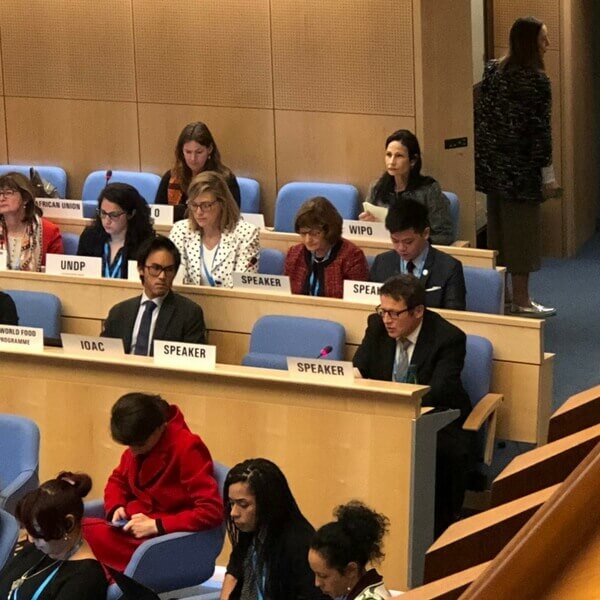Matthew RobinsonGHTC
Matthew Robinson is a policy and advocacy officer at GHTC who leads the coalition's multilateral advocacy work.
Last week’s World Health Organization (WHO) Executive Board (EB) meeting featured a packed agenda covering diverse topics ranging from WHO’s overall plan of work for 2019-2023 to the global burden of snakebite envenoming—as well as some unexpected chicken dancing by delegates. Given that the EB sets the agenda for May’s World Health Assembly (WHA), the inclusion of an agenda item on access to medicines and WHO’s plan on intellectual property (IP) indicates that we can expect a contentious few months leading to the WHA.
Here is how debates on these agenda items shook out:
For the third consecutive year, the EB addressed the issue of access to medicines and health technologies—a topic that has received much attention in recent years and sparked strong, diverse opinions from member states on how best to address. Last year at the WHA, member states reached a compromise to allow consideration of the findings of the United Nations Secretary-General’s High-Level Panel on Access to Medicines (HLP) at this year’s EB. For the meeting, the Secretariat produced a comprehensive report mapping out WHO’s current activities against the specific HLP recommendations. Though a number of countries objected to this approach on the grounds that it implicitly endorsed the findings of the HLP report, there was broad consensus in the room that access to medicines is a global problem that requires WHO action and that the agency could not afford to delay any longer.
As a result, the EB agreed on a decision point calling for WHO to develop a “roadmap report” outlining WHO’s work plans on access as part of the process of finalizing the overall 2019-2023 plan of work. This report will be submitted to the 2019 WHA.
 Speakers at the EB, 2018 (Photo: GHTC/Matt Robinson) While the access to medicines agenda item reached a consensus decision more quickly than expected, the debate on IP raged over multiple days during both
formal and informal sessions at the EB. The debate ultimately boils down to a divergence between high-income countries—countries with significant
pharmaceutical industries—and low- and middle-income countries on whether WHO is an appropriate forum to address IP. Those against WHO taking
an active role on IP (including the United States and Japan) argue that the World Trade Organization and the World Intellectual Property Organization
are the appropriate forums. On the other side, a coalition of countries led by Brazil and India argue that IP in medicines is a unique category and
that international policy must be set with a health perspective first. As the global normative organization for health, WHO is thus the appropriate
venue to address IP.
Speakers at the EB, 2018 (Photo: GHTC/Matt Robinson) While the access to medicines agenda item reached a consensus decision more quickly than expected, the debate on IP raged over multiple days during both
formal and informal sessions at the EB. The debate ultimately boils down to a divergence between high-income countries—countries with significant
pharmaceutical industries—and low- and middle-income countries on whether WHO is an appropriate forum to address IP. Those against WHO taking
an active role on IP (including the United States and Japan) argue that the World Trade Organization and the World Intellectual Property Organization
are the appropriate forums. On the other side, a coalition of countries led by Brazil and India argue that IP in medicines is a unique category and
that international policy must be set with a health perspective first. As the global normative organization for health, WHO is thus the appropriate
venue to address IP.
After many days of closed-door negotiations, the board ultimately decided to move forward with a consensus resolution text. It called for member states to implement recommendations from the new WHO report on IP and public health as appropriate for their national contexts and to continue further discussions and for the Director-General to begin implementing the recommendations and submit a progress report to WHA in 2020. Notably, the following provisions were stripped out of the resolution, including calls for member states to:
1. Promote transparency and understanding of research and development costs
2. Identify essential products at risk of shortages and take measures to prevent stock outs
3. Commit to dedicating at least .01 percent of gross domestic product to basic and applied research relevant to developing countries
GHTC will continue tracking these issues over the coming months heading into WHA, and we look forward to what will be a spirited meeting in May!